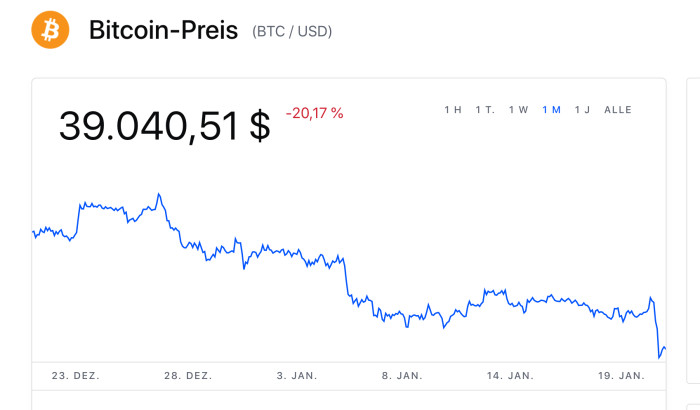The regulatory threats to crypto are mounting

It’s not been a great start to the year for HODLers. If governments (other than El Salvador’s) have their way, it could get a lot worse.
This week Russia, a massive centre for mining, proposed a clampdown on that and on trading. A vice-president of the European Securities and Markets Authority wants to outlaw some forms of crypto mining in the EU. Earlier this month, Madrid called time on dodgy adverts, while the UK plans on doing the same thing.
We expect more attempts to rein in the industry over the course of 2022. Global financial officialdom, which has made its distaste for crypto crystal clear, will continue to work on rules that would police banks’ activity in the sector through the Basel Committee on Banking Supervision.
None of this is exactly a surprise. Who, after all, would like their near-monopoly power to issue currency challenged?
Bitcoin is down more than 20 per cent over the past month (and more than 7 per cent over the past 24 hours).

That has more to do with the general retrenchment from risky assets than fears governments are about to get tough on the sector. Especially as the US authorities are yet to do anything meaningful (while crypto, meanwhile, has wasted no time in investing big in lobbying). But clearly, mining bans in places like Russia — previously a bit of a safe haven for the crypto sector — are unlikely to boost sentiment.
Will these threats to regulate crypto into parity with the rest of the financial system work?
Fiat’s challenge to crypto has two elements. There’s the “stick” of more stringent regulation, and then there’s the “carrot” of sovereigns coming up with their own forms of digital currencies. For the Empire to truly strike back, it needs to be able to fire from both flanks.
For all its faults, crypto represents a big challenge to official money because it allows for almost instant, anonymous payments to be made to people on the other side of the world. Obliterating crypto will, therefore, depend on whether states themselves are able to come up with a viable alternative. That is, a form of digital money that’s not only quick and cheap to use, but allows payments to be made away from the prying eyes of the state.
We’ve written in the past of the paradox this creates for officials. They might be keen on coming up with their own coins, but at the same time they’re reluctant to undermine their own anti-money laundering laws or, in the case of China, unwilling to miss out on an opportunity to hold vast amounts of information on people’s spending habits.
The Federal Reserve, for instance, this week indicated that any digital dollar would not enable people to make payments privately (take a look at this excellent Twitter thread from Rohan Grey for more on this).
All indications from voices of authority thus far are that to manage the AML/KYC issue, CBDCs will have to operate as ID-based systems rather than as bearer securities. At a minimum there will be ID rankings. The bigger the transaction, the more ID a person will need to provide for it to be approved and processed.
Even so this is still a major concern for many privacy advocates, who rightly observe that having to provide personal ID to private companies in a competing market is very different from being compelled to provide ID to the government that then links to all your day-to-day ‘funded activities’.
Without anonymity, it’s fair to ask who will want to hand massive amounts of their personal information to governments when many forms of payment already exist? Money is as money does. And, on the current evidence, CBDCs don’t.
Crypto might not be as decentralised and global as its advocates like to make out. But the way in which the technology is set up does present complications for regulators hell bent on reining it in.
Unless states manage to address the privacy problem — which may in fact be insurmountable — then you don’t have to be Yoda to work out that someone, somewhere in a galaxy not so far away will find a way to get around the rules and use technology to enable people — for reasons legitimate and otherwise — to make payments quickly, cheaply and anonymously.
And that sort of competition, overall, is probably a good thing for keeping any government alternatives honest and private.
Comments